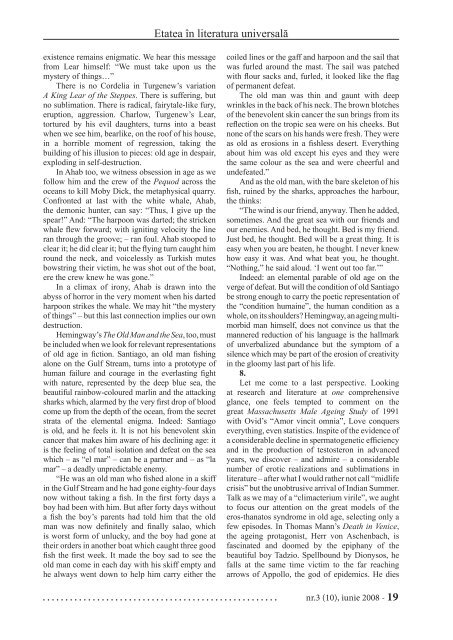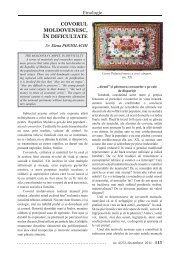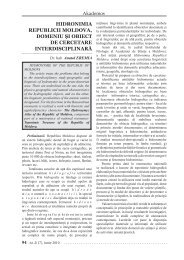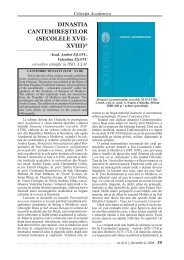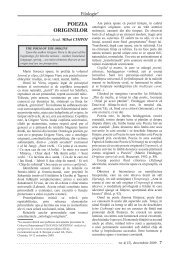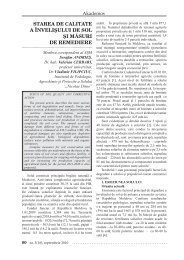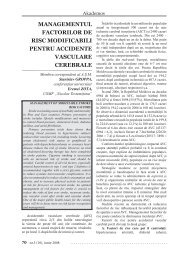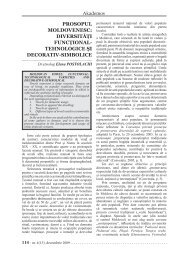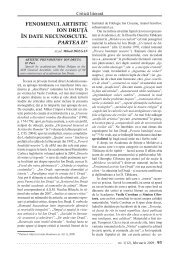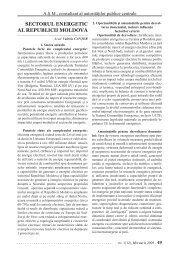Academos 3 2008.indd - Akademos - Academia de ÅtiinÅ£e a Moldovei
Academos 3 2008.indd - Akademos - Academia de ÅtiinÅ£e a Moldovei
Academos 3 2008.indd - Akademos - Academia de ÅtiinÅ£e a Moldovei
Create successful ePaper yourself
Turn your PDF publications into a flip-book with our unique Google optimized e-Paper software.
Etatea Repere în literatura şi obiective universală<br />
existence remains enigmatic. We hear this message<br />
from Lear himself: “We must take upon us the<br />
mystery of things…”<br />
There is no Cor<strong>de</strong>lia in Turgenew’s variation<br />
A King Lear of the Steppes. There is suffering, but<br />
no sublimation. There is radical, fairytale-like fury,<br />
eruption, aggression. Charlow, Turgenew’s Lear,<br />
tortured by his evil daughters, turns into a beast<br />
when we see him, bearlike, on the roof of his house,<br />
in a horrible moment of regression, taking the<br />
building of his illusion to pieces: old age in <strong>de</strong>spair,<br />
exploding in self-<strong>de</strong>struction.<br />
In Ahab too, we witness obsession in age as we<br />
follow him and the crew of the Pequod across the<br />
oceans to kill Moby Dick, the metaphysical quarry.<br />
Confronted at last with the white whale, Ahab,<br />
the <strong>de</strong>monic hunter, can say: “Thus, I give up the<br />
spear!” And: “The harpoon was darted; the stricken<br />
whale flew forward; with igniting velocity the line<br />
ran through the groove; – ran foul. Ahab stooped to<br />
clear it; he did clear it; but the flying turn caught him<br />
round the neck, and voicelessly as Turkish mutes<br />
bowstring their victim, he was shot out of the boat,<br />
ere the crew knew he was gone.”<br />
In a climax of irony, Ahab is drawn into the<br />
abyss of horror in the very moment when his darted<br />
harpoon strikes the whale. We may hit “the mystery<br />
of things” – but this last connection implies our own<br />
<strong>de</strong>struction.<br />
Hemingway’s The Old Man and the Sea, too, must<br />
be inclu<strong>de</strong>d when we look for relevant representations<br />
of old age in fiction. Santiago, an old man fishing<br />
alone on the Gulf Stream, turns into a prototype of<br />
human failure and courage in the everlasting fight<br />
with nature, represented by the <strong>de</strong>ep blue sea, the<br />
beautiful rainbow-coloured marlin and the attacking<br />
sharks which, alarmed by the very first drop of blood<br />
come up from the <strong>de</strong>pth of the ocean, from the secret<br />
strata of the elemental enigma. In<strong>de</strong>ed: Santiago<br />
is old, and he feels it. It is not his benevolent skin<br />
cancer that makes him aware of his <strong>de</strong>clining age: it<br />
is the feeling of total isolation and <strong>de</strong>feat on the sea<br />
which – as “el mar” – can be a partner and – as “la<br />
mar” – a <strong>de</strong>adly unpredictable enemy.<br />
“He was an old man who fished alone in a skiff<br />
in the Gulf Stream and he had gone eighty-four days<br />
now without taking a fish. In the first forty days a<br />
boy had been with him. But after forty days without<br />
a fish the boy’s parents had told him that the old<br />
man was now <strong>de</strong>finitely and finally salao, which<br />
is worst form of unlucky, and the boy had gone at<br />
their or<strong>de</strong>rs in another boat which caught three good<br />
fish the first week. It ma<strong>de</strong> the boy sad to see the<br />
old man come in each day with his skiff empty and<br />
he always went down to help him carry either the<br />
coiled lines or the gaff and harpoon and the sail that<br />
was furled around the mast. The sail was patched<br />
with flour sacks and, furled, it looked like the flag<br />
of permanent <strong>de</strong>feat.<br />
The old man was thin and gaunt with <strong>de</strong>ep<br />
wrinkles in the back of his neck. The brown blotches<br />
of the benevolent skin cancer the sun brings from its<br />
reflection on the tropic sea were on his cheeks. But<br />
none of the scars on his hands were fresh. They were<br />
as old as erosions in a fishless <strong>de</strong>sert. Everything<br />
about him was old except his eyes and they were<br />
the same colour as the sea and were cheerful and<br />
un<strong>de</strong>feated.”<br />
And as the old man, with the bare skeleton of his<br />
fish, ruined by the sharks, approaches the harbour,<br />
the thinks:<br />
“The wind is our friend, anyway. Then he ad<strong>de</strong>d,<br />
sometimes. And the great sea with our friends and<br />
our enemies. And bed, he thought. Bed is my friend.<br />
Just bed, he thought. Bed will be a great thing. It is<br />
easy when you are beaten, he thought. I never knew<br />
how easy it was. And what beat you, he thought.<br />
“Nothing,” he said aloud. ‘I went out too far.’”<br />
In<strong>de</strong>ed: an elemental parable of old age on the<br />
verge of <strong>de</strong>feat. But will the condition of old Santiago<br />
be strong enough to carry the poetic representation of<br />
the “condition humaine”, the human condition as a<br />
whole, on its shoul<strong>de</strong>rs? Hemingway, an ageing multimorbid<br />
man himself, does not convince us that the<br />
mannered reduction of his language is the hallmark<br />
of unverbalized abundance but the symptom of a<br />
silence which may be part of the erosion of creativity<br />
in the gloomy last part of his life.<br />
8.<br />
Let me come to a last perspective. Looking<br />
at research and literature at one comprehensive<br />
glance, one feels tempted to comment on the<br />
great Massachusetts Male Ageing Study of 1991<br />
with Ovid’s “Amor vincit omnia”, Love conquers<br />
everything, even statistics. Inspite of the evi<strong>de</strong>nce of<br />
a consi<strong>de</strong>rable <strong>de</strong>cline in spermatogenetic efficiency<br />
and in the production of testosteron in advanced<br />
years, we discover – and admire – a consi<strong>de</strong>rable<br />
number of erotic realizations and sublimations in<br />
literature – after what I would rather not call “midlife<br />
crisis” but the unobtrusive arrival of Indian Summer.<br />
Talk as we may of a “climacterium virile”, we aught<br />
to focus our attention on the great mo<strong>de</strong>ls of the<br />
eros-thanatos syndrome in old age, selecting only a<br />
few episo<strong>de</strong>s. In Thomas Mann’s Death in Venice,<br />
the ageing protagonist, Herr von Aschenbach, is<br />
fascinated and doomed by the epiphany of the<br />
beautiful boy Tadzio. Spellbound by Dionysos, he<br />
falls at the same time victim to the far reaching<br />
arrows of Appollo, the god of epi<strong>de</strong>mics. He dies<br />
nr.3 (10), iunie 2008 - 19


